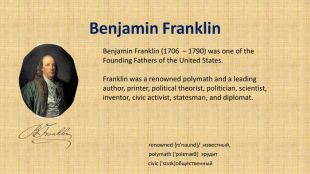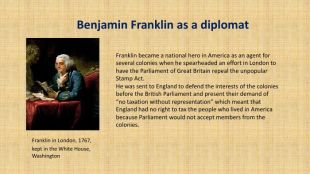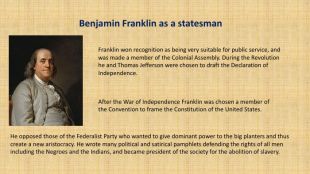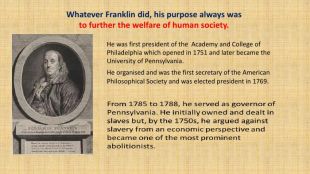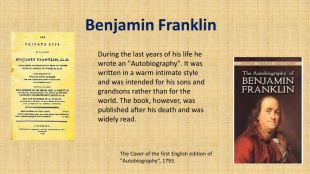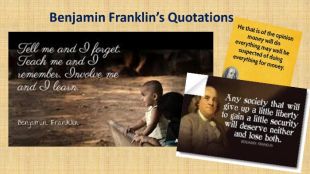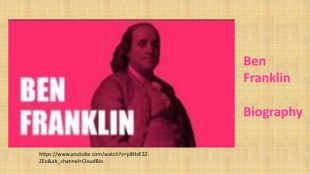Доба Просвітництва. Бенджамін Франклін (Презентація)








![Benjamin Franklin (1706 – 1790) was one of the Founding Fathers of the United States. Franklin was a renowned polymath and a leading author, printer, political theorist, politician, scientist, inventor, civic activist, statesman, and diplomat.renowned [rɪ'naund]/ известный,polymath ['pɔlɪmæθ] эрудитcivic ['sɪvɪk]общественный Benjamin Franklin (1706 – 1790) was one of the Founding Fathers of the United States. Franklin was a renowned polymath and a leading author, printer, political theorist, politician, scientist, inventor, civic activist, statesman, and diplomat.renowned [rɪ'naund]/ известный,polymath ['pɔlɪmæθ] эрудитcivic ['sɪvɪk]общественный](/uploads/files/2059233/322500/352245_images/9.jpg)












The literature of the 18th century is called the literature of the Enlightenment. It covers the century period - from 1688 to 1789. England became the motherland of the Enlightenment, where the Glorious Revolution took place in 1688, as a result of which the bourgeoisie came to power. Enlightment and Literature. In the historical development of culture, the Enlightenment is distinguished by a huge concentration of qualitatively new ideas, born and implemented in an extremely short time.
Representatives of the Enlightenment were convinced that by rationally changing and improving social forms of life, it is possible to change every person for the better. On the other hand, a person who has intelligence is capable of moral improvement, and the education and upbringing of each person will improve society as a whole. Against the background of the material and spiritual realities of that time, they considered a person in his relationship with reality, in the struggle for a worthy place in life. Undoubtedly, the literature of the Age of Enlightenment with its approach to life, the way it is reflected, the type of positive hero and artistic features was a qualitatively new, natural stage in the development of world literature.
During this period, bourgeois values such as: the value of life, freedom and equality are established. Intelligence acquires special value. The ideal of this era is an educated ruler who cares about the education of his people. The following ideas are characteristic of the Age of Enlightenment: along with philosophy and education, there was fiction, which was highly valued precisely for its broad possibilities of influence on society and its consciousness. The artistic discovery of the Age of Enlightenment became new genres, which included the philosophical novel and the novel of education, which reflected the very spirit of the era with its desire for knowledge and education. What ideas are characteristic of the Age of Enlightenment?
The activities of Benjamin Franklin, Thomas Jefferson, Thomas Paine, like other representatives of the enlightenment movement, contributed to Enlightenment entering the treasury of world culture as a unique and necessary part. Their achievements are still enriching the spiritual world of man.
The chief aim of the writers of Enlightenment was to diffuse republican ideas among the people, to expose the tyranny of monarchism, and defend the rights of man against the Church and the outdated feudal laws. Unlike the French philosophers of the early 18th century who never lived to see their revolution, the American writers of their Age of Reason were able to see their ideas materializing. They all contributed to the success of the Revolution. The outstanding writers of the time were Benjamin Franklin, Thomas Jefferson, Thomas Paine.
Thomas Jefferson (1743 – 1826) was an American statesman, diplomat, lawyer, architect, philosopher, and Founding Father who served as the third president of the United States from 1801 to 1809. He was previously the first United States secretary of state under George Washington. The principal author of the Declaration of Independence, Jefferson was a proponent of democracy, republicanism, and individual rights, motivating American colonists to break from the Kingdom of Great Britain and form a new nation. A philologist, Jefferson knew several languages. He was a prolific letter writer and corresponded with many prominent people. Among his books is Notes on the State of Virginia (1785), considered perhaps the most important American book published before 1800. Jefferson championed the ideals, values, and teachings of the Enlightenment. As president, Jefferson pursued the nation's shipping and trade interests against aggressive British trade policies. In 1807, American foreign trade was diminished when Jefferson implemented the Embargo Act in response to British threats to U. S. shipping. The same year, Jefferson signed the Act Prohibiting Importation of Slaves.
Paine barely survived the transatlantic voyage. The ship's water supplies were bad and typhoid fever killed five passengers. On arriving at Philadelphia, he was too sick to disembark. Benjamin Franklin's physician, there to welcome Paine to America, had him carried off ship. He became a citizen of Pennsylvania "by taking the oath of allegiance at a very early period". Thomas Paine (1737–1809) was an English-born American political activist, philosopher, political theorist, and revolutionary. He authored Common Sense (1776) and The American Crisis (1776–1783), two of the most influential pamphlets at the start of the American Revolution, and helped inspire the Patriots in 1776 to declare independence from Great Britain, theretofore an unpopular cause. His ideas reflected Enlightenment-era ideals of transnational human rights. Paine has a claim to the title The Father of the American Revolution, which rests on his pamphlets, especially Common Sense, which crystallized sentiment for independence in 1776. It was published in Philadelphia on January 10, 1776, and signed anonymously "by an Englishman. ". It was an immediate success, quickly spreading 100,000 copies in three months to the two million residents of the 13 colonies.
Benjamin Franklin (1706 – 1790) was one of the Founding Fathers of the United States. Franklin was a renowned polymath and a leading author, printer, political theorist, politician, scientist, inventor, civic activist, statesman, and diplomat.renowned [rɪ'naund]/ известный,polymath ['pɔlɪmæθ] эрудитcivic ['sɪvɪk]общественный
Marble memorial statue, Benjamin Franklin National Memorial. Franklin earned the title of "The First American" for his early and indefatigable campaigning for colonial unity, initially as an author and spokesman in London for several colonies. As the first United States Ambassador to France, he exemplified the emerging American nation.spokesman ['spəuksmən] представитель,
Franklin in London, 1767, kept in the White House, Washington. Franklin became a national hero in America as an agent for several colonies when he spearheaded an effort in London to have the Parliament of Great Britain repeal the unpopular Stamp Act. He was sent to England to defend the interests of the colonies before the British Parliament and present their demand of “no taxation without representation” which meant that England had no right to tax the people who lived in America because Parliament would not accept members from the colonies. Benjamin Franklin as a diplomat
Benjamin Franklin as a diplomat. He was sent to France where he succeeded in procuring financial aid in the sum of 26 million francs, and most important, the one thing America needed — a fleet. Franklin wrote many essays while in France. His writings helped to create sympathy in Europe for the American people in their struggle for independence, and many countries were ready to recognize the young American Republic. An accomplished diplomat, he was widely admired among the French as American minister to Paris and was a major figure in the development of positive Franco-American relations.
"Poor Richard's Proverbs", adages from this almanac, remain common quotations in the modern world. ("Fish and visitors stink in three days“)Benjamin Franklin as a man of letters Franklin became a successful newspaper editor and printer in Philadelphia, publishing the Pennsylvania Gazette at the age of 23. He became wealthy publishing this and Poor Richard's Almanack, which he authored under the pseudonym "Richard Saunders".adage ['ædɪʤ] афоризм, изречение,
Benjamin Franklin as a statesman. Franklin won recognition as being very suitable for public service, and was made a member of the Colonial Assembly. During the Revolution he and Thomas Jefferson were chosen to draft the Declaration of Independence. After the War of Independence Franklin was chosen a member of the Convention to frame the Constitution of the United States. He opposed those of the Federalist Party who wanted to give dominant power to the big planters and thus create a new aristocracy. He wrote many political and satirical pamphlets defending the rights of all men including the Negroes and the Indians, and became president of the society for the abolition of slavery.
He was first president of the Academy and College of Philadelphia which opened in 1751 and later became the University of Pennsylvania. He organised and was the first secretary of the American Philosophical Society and was elected president in 1769. Whatever Franklin did, his purpose always was to further the welfare of human society.
The Cover of the first English edition of "Autobiography“, 1793. During the last years of his life he wrote an "Autobiography". It was written in a warm intimate style and was intended for his sons and grandsons rather than for the world. The book, however, was published after his death and was widely read.
What period does the Enlightment cover?What are the characteristic features of the Enlightment era?Who of the prominent Americans can be named as the representatives of the Enlightment?Thomas Jefferson, what is he famous for?Who was called “The Father of the American Literature”?What was the main aim of the writers of the Age of Reason in America?Why did Franklin earn the title of “The First American”?What was the mission of Franklin in London, when he was sent there as a diplomat?What was Franklin’s role in establishing positive Franco-American relations?Questions for discussion


про публікацію авторської розробки
Додати розробку









